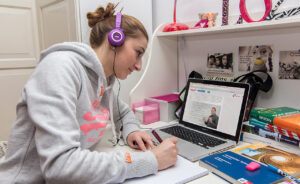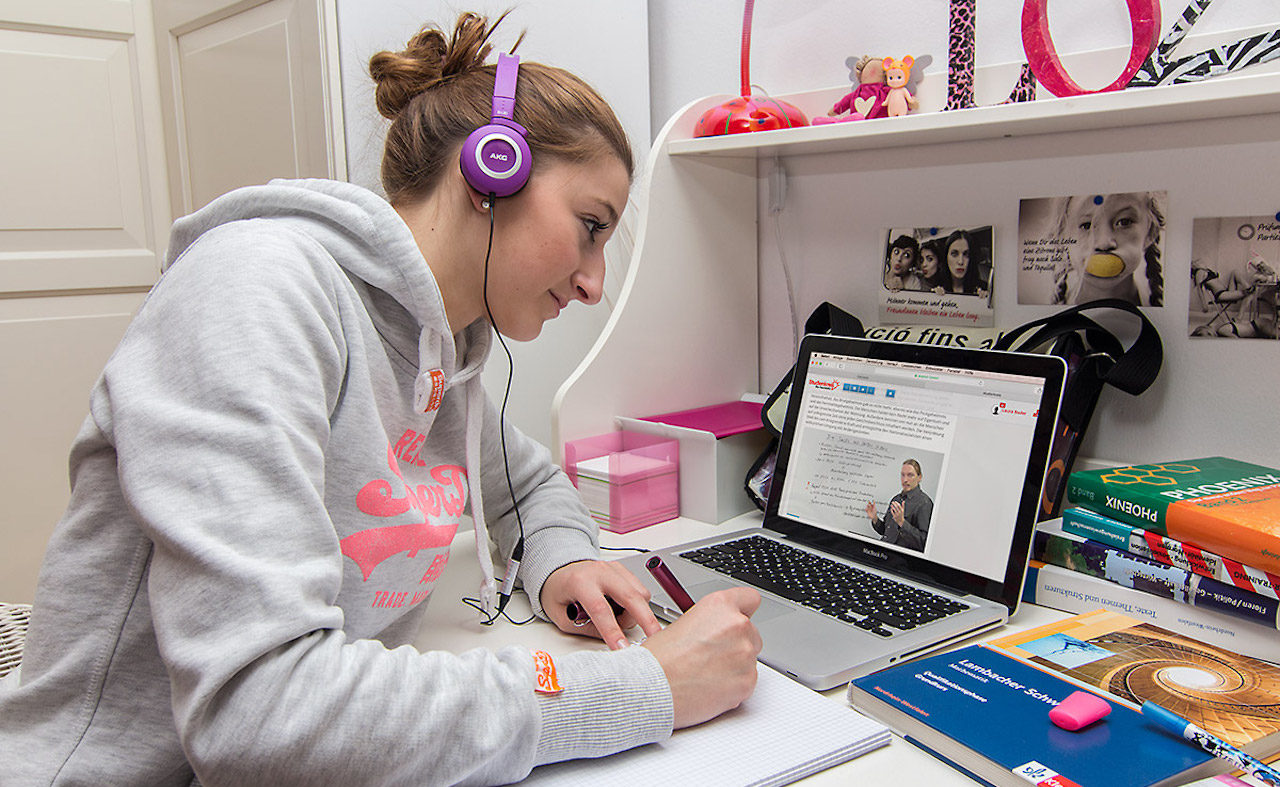
A young girl completing work on her computer. This type of independent learning is what BEACON offers. They use a digital Cognitive Behavioural Therapy approach to support their clients’ various mental health needs. (Wikimedia/Studienkreis GmbH)
Stefanie Ucci
In an era where everything and anything can be done online, the therapy field is no exception to the phenomenon of eliminating in-person interactions to get things done.
Many critics have argued technology increases mental health issues in young people and, while this may be true in regards to social media, technology can still be used to aid people on a journey to recovery and wellness.
That’s where digital therapy comes in. Companies offering therapy via instant messaging, phone calls or video chats pop up every year.
Two well-known online counselling portals are BetterHelp and Talkspace, which put therapists in the pockets of users at all times.
Talkspace was unable to interview with HumberNews. BetterHelp declined an interview with HumberNews and said its therapists are busy with clients.
Lacey Allain, 24, is a Talkspace user and said she enjoys the accessibility of the digital therapy platform.
“This format is helpful to me because it eliminates the anxiety of actually physically attending an appointment,” Allain said. “I become exhausted pretty easily with social situations and for this reason I have never actually been to a therapist before.”
Allain uses Talkspace to help with anxiety and depression. She said the only thing she can foresee stopping her use of the app is the high, uninsured cost compared to in-person therapy which is almost completely covered by her insurance plan.
However, Allain said the benefit of being able to speak to a therapist in the comfort of her own home outweighs the cost.
“The particular therapist I chose is very helpful in terms of allowing me to explore my own thought patterns in a non-invasive way,” she said.
A real BEACON story: “I feel like I'm opening a new chapter in my life.” #mentalhealth #iCBThttps://t.co/OeGjerry1z pic.twitter.com/lQB5WEqeRo
— MindBeacon (@MindBeacon) March 16, 2019
There are smaller companies offering digital therapy that are both accessible and affordable for those in need of mental health support.
BEACON provides online psychotherapy and operates on both smartphones and computers across Canada.
It was launched in 2017 and offers a Cognitive Behavioural Therapy (CBT) approach and is a subsidiary of CBT Associates.
Nadia Keung, head of marketing, said CBT is the most studied form of therapy and is recommended as an effective treatment for conditions such as anxiety, depression, and PTSD.
“Cognitive Behavioural Therapy is very focused on teaching the individual to build resiliency skills so that they in effect have the skills to manage their own thoughts and feelings in a healthy way,” Keung said.

A typical face-to-face therapy session. Digital therapy allows clients to talk to their therapists using their cell phone or computer which eliminates the need for in person counselling for mental health issues. (Pixabay/tiyowprasetyo)
She said studies have concluded CBT is just as effective as medication as it uses readings and exercises tailored to individuals’ conditions to guide them through the process to recovery. These activities are what allows CBT to lend itself well to digital therapy.
“You actually don’t need to lean on your therapist and have weekly sessions where you’re talking to them for an hour which is kind of the traditional model of looking at therapy,” Keung said.
One session of BEACON covers 12 weeks of communication with a therapist. Keung said most clients finish within eight to 10 weeks and complete the program which means “they feel confident enough to move forward with the skills they’ve built with BEACON.”
Keung said BEACON does not use phone calls or face-to-face sessions so all communication with the therapist is done via the messaging platform.
She said clients complete the exercises on their own and can message their therapist with questions or concerns and will receive an answer within one to two business days.
The same therapist guides the user through the process so they are familiar with the history and challenges of the client, Keung said.
BEACON uses therapists that are registered social workers and are regulated from province to province.
Keung said they are currently working with Green Shield Canada insurance. Mohawk College recently added BEACON to their inventory of counseling services offered to its students as part of the educational experience.
For those who aren’t comfortable with instant messaging forms of therapy but don’t have the time for face-to-face sessions, a solid middle ground exists at Core Coaching.
Joanne Del Core, an Emotional Intelligence Strategist and Clinician, offers phone and video therapy sessions to her clients in need of anxiety, stress, and PTSD support.
“Phone calls enable me to be very astute so I’m not interrupted by the environment I’m in and I can really zero in on the individual and their energy shift and it really fine-tuned my intuitive side,” she said.
Phone calls are effective therapy treatment for Del Core and she said this is evident in the fact that crisis lines exist for people to call in their most urgent state.
Del Core said her ideal situation is to incorporate phone and video into her sessions.
“With video, I can see how the person interacts with the words I use without the person realizing that they’re being impacted,” she said. “If I say something and then hear a pause, I can notice if the client is moving their eyes or shifting back into their body or standing up straight.”
Del Core said symptoms are reported by the client but her video and audio work help her pick up and identify the signs.
Her brand, called Be Anxiety Free, was founded in 2009. She offers free 20–minute consultations, a 14–day Negativity Fast, and a five–week eCourse.
Del Core’s website is filled with positive testimonials from thankful clients for her convenient and life changing digital therapy experience.

